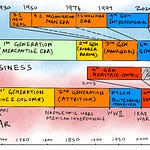In this episode of Breaking Smart podcast, I want to explore what it means to say that Covid has accelerated everything. If so, it means we’ve done some time travel relative the old timeline. As the cryogenic lab tech said to Philip J. Fry on Futurama, when he landed in the year 2999, welcome to the world of tomorrow!
1/ Let’s set the stage a bit. We’re now in the early days of post-Covid for at least some people, in some parts of the world. We don’t yet know how costly the endemic management problem will be, in terms of treatment, vaccination, fatality prevention, and surveillance, but it feels like we have one foot out of the tunnel now.
2/ I don’t know about you, but I personally feel a bit like Fry in the pilot of Futurama. Right after he is greeted with “Welcome to the world of tomorrow!” he is assessed to determine what sort of “career chip” should be implanted in him, because in the bureaucratic future, everybody has a career determined for them.
3/ The joke is, he is assessed to be best fit to the job of “delivery boy,” the same job he hated in 1999, so he runs away from the career assessment officer, Leela. As it happens, by the end of the pilot, he ends up a delivery boy anyway, but with an illegal career chip, but is happy about it because he gets to work on a spaceship and has new friends.
4/ I hope to get my vaccine within the next few weeks, and the idea reminds me of the idea of Futurama career chip, including vaccine hesitancy. In many ways, this is not far wrong, what with all the talk of vaccine passports, green zones, and so on your vaccine status might shape your career. Unlike Fry, I don’t want to run from the career chip. I don’t have career chip hesitancy. I’m kinda looking forward to reinventing my life in ways that I didn’t expect to till 2031.
5/ Even the idea of a very bureaucratic future is not wrong. Given the amount of fiscal stimulus, the effects of new geopolitics with China, and vaccine nationalism, the role of states everywhere has become radically stronger. Like it or not, the world of tomorrow has governments everywhere getting more into your business, not less. Not least because governments effectively own a lot of assets through the loans they have provided for bailouts and stimulus.
6/ So the vaccine can be considered philosophically like a career chip for a new life in a future we’ve time traveled to, and are still getting used to. One of the signs for me has been that my Twitter feed, which is my main sense-making media feed these days, feels mis-tuned, and I’m re-tuning it. It feels like wearing glasses with the wrong prescription. Everything is a little blurry and distorted.
7/ Okay, so we’re in the future, and like Fry and other time travelers, one of our first questions should be, what year is it? Obviously, no provable answer is possible to this question, since we can’t actually run a believable no-Covid simulation. The new timeline might not even be comparable at all to the old one, because qualitatively different sets of things are happening or not happening. Maybe we’ve gone sideways rather than leaped forwards. Some parts of the world have definitely gone backwards.
8/ I do think the idea of an acceleration is well-posed though, and that we do overall have a forward acceleration rather than a sideways or backwards leap. I’m just going to propose 2031 as a strawman answer to what year it is, with the caveat that you shouldn’t anchor on it. The point of pretending we’ve time traveled 10 years in 1 year is to break old habits of thought and reorient. So how do we do that?
9/ One way to think of this is as a weighted average of trends by acceleration. So for example, if vaccines jumped ahead 20 years, but other kinds of medicine stayed the same, and public health for pandemics is 50% of all healthcare by cost, then you could say the average leap ahead is 10 years.
10/ But this is kinda silly, like applying a uniform rate of inflation even though your consumption basket may be very different from the consumer price index. In thinking about inflation, you should probably think about inflation in the specific range of goods you consume. So by analogy, in thinking about acceleration, you should think about the specific range of trends you’re riding, or not. A personalized basket of accelerations.
11/ For example, let’s say work-from-home would have progressed at a particular rate, such that we are now where we would have been in 2040 otherwise, which I think is true. What does that mean? Well for me, it doesn’t mean much, since I’ve been working from home since 2009. The big difference for me is actually being unable to work from Starbucks, and whatever acceleration is going to hit cafe culture.
12/ You can measure the importance of a particular acceleration in several ways. Like for WFH, you could talk about commute miles saved, C02 emissions from commute avoided, webcam sales, GDP of commercial vs. home office furniture, traffic at business district vs. entertainment district restaurants, etc. All these would be good macro measures of acceleration.
13/ At a personal level, you could simply think in terms of well-being improvements, and more time created due to not having to commute. The personal acceleration in this case could be an earlier arrival of lifestyle elements that you only expected with retirement, if at all.
14/ Some things are tricky when you talk about accelerations. For example, with a slower rate of shift to WFM, real estate would have evolved in sync, so commercial real estate would have shrunk, while residential square footage would have increased. But this takes time. Time we didn’t spend. So what are the implications of that?
15/ I recall reading somewhere that housing stock takes 70 years to churn, so if we logged 20 years worth of trend time in 1 year, then we have a churn-demand shock worth 1/3 of the total housing stock. Or to put it another way, 1/3 of real estate, both commercial and residential, is now either under distress from underuse or overuse.
16/ By a similar logic, car fleets take about 10-20 years to churn through, depending on the country’s laws about old cars. Public transit projects probably take about the same on average. WFH changed a lot of demand patterns overnight, so now you have idle cars and empty trains, and people rethinking their car situations earlier.
17/ When you look at all these individual accelerations, one thing that you might notice is that we’re talking about something very different from the acceleration due to Moore’s Law, the sort of everything-is-faster megatrend that gave rise to philosophies like accelerationism.
18/ This isn’t that. To the extent that was true, it is still going on. To the extent that was a shaky hypothesis, it still is. What we’re talking about is a different kind of acceleration from a one-time drastic shift, caused by a pandemic shocking the system into a new equilibrium that looks like the future we used to extrapolate.
19/ Let’s talk a bit more about how weird it is that we’ve leaped forward rather than sideways or backwards. A different kind of shock could have easily shifted us sideways into a kind of future we weren’t thinking about, a parallel timeline. Or it could have thrown us back into a more primitive past. But this one uniquely seems to have kicked us forward. Yes we’ve shifted sideways a little bit, and backwards a little bit, but the vector sum of all the accelerations seems to have been a global fast-forwarding effect.
20/ I think this is for two reasons. One, pandemics aren’t black swans. They’re not unknown unknowns. Not only do we have recorded histories of several examples to learn from, we’ve specifically had experts predicting this kind since SARS in 2003, and have even made what are in hindsight fairly realistic movies about it. Global civilization has a lot of cultural memory of pandemics, and ways of responding without being knocked off its historical course. This would not have been true of say an asteroid hitting earth or a major nuclear war.
21/ Second, many of the trends that have accelerated, such as WFH and climate action, were dealing with inertia effects. The pandemic did the equivalent of knocking out some inertia, causing a sudden, jerky leap forward. Kinda like dumping some cargo off an overloaded truck might cause it to leap forward.
22/ I think the right unit of analysis for thinking about acceleration is categories that have necessary, flexible roles in the world, with relatively linear evolution paths, no clear substitutes, and a lot of baggage available to shed. For example, cars, homes and countries. All are entities with steady rates of evolution, and loads of baggage.
23/ For example, cars were already undergoing dual trends of electrification and computerization, and on pre-pandemic timelines automakers were planning to fully transition to EVs in a decade or so. That’s probably accelerated because I suspect people will buy cars sooner now.
24/ EVs should be cheaper in the long run than IC engine cars, but in the short run, cars are actually getting way more expensive due to more compute elements. For example, cheap bumpers are now expensive to replace after an accident because they hold cameras and radars.
25/ So even though we’re probably in the same future qualitatively — more computerization and electrification is still going to happen, we’ve probably accelerated by at least a few years. Some things though, have shifted sideways. The idea of cars as a cloud-like on-demand service might take a hit, and more people might want to own cars. We’ve learned the importance of controlling some of your own physical assets and environments. Those who relied purely on rideshare or transit probably faced more risk last year.
26/ You can do a similar analysis for other stable units of our world. Countries are interesting. I’d say they were weakening before Covid, but have been made stronger. Vaccine development, public health management, and supply chain geopolitics have all strengthened the role of country-sized units.
27/ When you talk of more diffuse trends, without clear units, things get murkier. Two such examples are climate change and extremist politics.
28/ I think for a lot of people, Covid was a sort of prequel to how climate action might unfold. It doesn’t matter whether you believe in it or not, just as it didn’t matter whether or not you believed in Covid or vaccines. Enough people believe that there will be drastic responses. And I think Covid gave people sitting on a lot of capital a reason to start putting it into climate response investments. One example is the rise in SPACs. I suspect that’s going to be a lot more sideways than an acceleration though.
29/ It’s hard to judge what’s happened to politics, but I think it’s fair to say that both far left and far right currents got to crucial tests of their coherence and capacity to govern far earlier than they otherwise would have. Ideas that were outside the Overton window, like UBI got an early test through things like stimulus checks. I suspect the culture war overall accelerated by about 4-5 years at least. We’re already at the point in the conflict that might have otherwise arrived around 2025.
30/ To get back to the personal question, and the idea of a personal basket of accelerations leading to a personal estimate of how far in the future you’ve jumped, I think it’s a useful exercise to think about that, and also think about the question of what kind of new career chip you should install in your head, suited to the future you’re in, based on how far into the future you’ve leaped.
31/ How much of a jump have you made? I think looking at your typical sources of information and sensing how out-of-tune they feel, like with Twitter in my case, is a good starting point. The more weird your old pre-Covid news feed feels, the farther into the future you’ve leaped.
32/ Then you can think about the specific persistent units in your life, and how they might change or should change. In my case, I’m already thinking of living situations and travel plans in ways that I didn’t expect to be until 2031. I moved to a bigger apartment last year, and will probably look for a bigger place in a smaller city in the next few years. My domestic travel is probably going to go sharply down but my international travel and living might go up.
33/ I think the world of work has changed too. There is now more fat in supply chains, more resilience and sustainability in both production and climate senses. There is more national structure to industries. The story of vaccine nationalism might repeat in sectors like semiconductors and other critical and strategic ones. As a consultant, I’m rethinking how I approach my work.
34/ On this front, I am trying out patterns of work that I didn’t expect to see for years, such as more collaboration with other indies and free agents. I think relatively shallow managerial cultures are on their way out, and a more depth-oriented culture is on the rise, where people are expected to understand narrower parts of the tech stack, geographies, and markets more deeply. It’s an overall shift to a more vertical-grained global industrial structure, at the sectoral and national level. Again, this is what I expected with software eating the world, but not for another decade.
35/ Overall, I find this frame of a net acceleration, personalized to my context, very useful. The thought experiment of living in 2031, and installing a new career chip in my head, is very useful, and I recommend you try it.
So that’s it for this week, I’ll be back again next week with another essay for subscribers.













Welcome to the World of Tomorrow